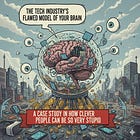Reasons for quietude
Grants - my new ERC JUSTICE project, and, separately, the Cognitive Republic project
I’ve been a little quieter this past month than usual, although I did deliver three lengthy pieces - icym them, here they are:
At the risk of self-praise, I’m very happy with the Alien/Xenomorph and P…





